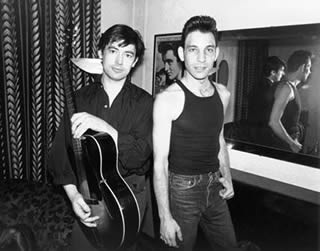RTH: Once and for all: Did any of your guitar playing end up on Never Mind The Bollocks?
CS: No.
RTH: Do you still have the demos that you worked on with them? (Not the “Spedding Tapes,” which I’ve read were not your original versions.) Can I have a copy? (I’ll trade you for a Rock Town Hall T-Shirt.)
CS: Dave Goodman copied my tapes, adding echo. I have no idea why he did this. My tapes are the ones without echo and low-fi versions of them taken from a 1976 cassette were included by Virgin Records on the reissue of “Bollocks” put out at the time of the first reunion. I had the studio masters of the tapes. Still have a digital copy on a CD. No one at Virgin asked me for the originals.
RTH: There seems to be some mystery regarding your involvement with The Bay City Rollers. Please take this opportunity to set the record the straight.
CS: I didn’t think I played on any of their sessions. I may have done since the band members were rarely at recording sessions (except for the lead singer). One band member (forget who) and one session guy (drummer Clem Cattini) thinks I played on the sessions.
RTH: You’ve participated in a vast number of musical genres but your solo work has a definite blues/rock/rockabilly bent to it. Is this where your musical heart is?
CS: Blues, R’n’B, early rock (we never called it “rockabilly”), and jazz.
RTH: What is the “Chris Spedding Sound?” What do you think has made you so valuable to so many great artists?
CS: A Gibson guitar played thru’ a Fender amp with no pedal effects?

Robert Gordon & Chris Spedding, “Lawdy Miss Clawdy”
RTH: On It’s Now or Never, your recent collaboration of Elvis Presley covers with Robert Gordon, you’ve got some big shoes to fill. How did you balance your own guitar style with those of the songs’ original parts?
CS: I tried to play like Scotty Moore. If it sounds like me it’s cos I didn’t succeed.
RTH: It seems that you’ve done more with Robert Gordon than any other individual artist. Is that accurate? How did you guys get together? Looks like you’re touring in 2008. What are you guys up to?
CS: We’ll keep playing as long as people want to hear us.
RTH: Finally, we play a little game now and then called Dugout Chatter, in which we pose sometimes silly questions to poll readers’ gut responses. We like to have our guests answer such questions. Here goes. Your quick, gut reactions or quick answers are all we ask.
Next: Chris stirs up some Dugout Chatter!


Great work, Sammy! Spedding’s final answer in Dugout Chatter made my day.
I’ll second that. I really enjoyed the interview, but I wanted to wait to comment because I wanted to click on all the cool extras. I like his sound. I’m gonna listen to Here Come the Warm Jets and pay a little extra attention. Thanks, sammy. That was really worthwhile!
His image being sort of a bad boy, it was a pleasure to find Spedding being such a gentleman in the interview.
I wonder if not calling early rock ‘rockabilly’ is an English thing, or who the ‘we’ is in “we never called it rockabilly.”
It’s good to know the secret to his sound (Gibson through a Fender no effects). Spedding is the only current player of a Flying V who comes to mind.
His work on those Island-era John Cale albums was incredible.
I loved his rockabilly answer. I’m not old enough to have been present at the genre’s purported birth, but I do recall its rebirth in the late-70s/early-80s. I find the term limiting and distracting, bringing to mind too many of the totemic items that followers of the Stray Cats cling to dearly. I always thought it was cool that Spedding played a Flying V. He played that stuff like it was ROCK ‘n ROLL, and it was cool to see that suspicion borne out in his comments.
I didn’t know he had a Bad Boy rep. From what Sammy told me, he was a total gentleman throughout the courting process. His story of jamming on Shadows tunes with Fripp was great.
I think one thing calling it rockabilly does is clarify that the music came from country music as much as R&B. The Brits and the revivalists tended to lose sight of rock’s country roots.
Oh, and the ‘bad boy’ comment was meant to imply that I was judging by his Look. I wrote the book on projecting ‘bad boy’ while being a sweetheart inside. Ok, maybe I just read that book.
BigSteve, your country roots comment is spot on. I got turned on to country in the 70’s and found that there was a lot to like (more to hate, but the stuff that feeds off the rock and roll mainline is great). All I ever hear from my classic rock loving friends is that rock came from the blues, and when I bring up the fact that all the studio guitar players from rock’s earliest days were white, country players they completely ignore me and tell me it’s all about Muddy and the Wolf.
I won’t deny that the blues are a huge part of rock n roll, but so is country. I think I tend to lean more towards the rock music that has less blues/more country.